 Okay, puns aside, 1995's The Rapture gets a bad rap. The final Siouxsie & The Banshees studio album's biggest crime is that it is split in two and didn't innovate their sound forward as they had done on their 'masterpiece' Peepshow (1988) and the big pop of Superstition (1991). It sold poorly, their American alternative 'relevance' had vanished, having previously toured with Lollapalooza in the 90s and scored a #23 US Billboard Hot 100 hit single to boot, and they lost their record deal after Siouxsie was quoted in Time Out saying 'I wouldn't piss on Polydor Records if they were on fire', and called it quits ironically just as the Sex Pistols reformed.
Okay, puns aside, 1995's The Rapture gets a bad rap. The final Siouxsie & The Banshees studio album's biggest crime is that it is split in two and didn't innovate their sound forward as they had done on their 'masterpiece' Peepshow (1988) and the big pop of Superstition (1991). It sold poorly, their American alternative 'relevance' had vanished, having previously toured with Lollapalooza in the 90s and scored a #23 US Billboard Hot 100 hit single to boot, and they lost their record deal after Siouxsie was quoted in Time Out saying 'I wouldn't piss on Polydor Records if they were on fire', and called it quits ironically just as the Sex Pistols reformed.The Rapture just kind of snuck in. Lead single O Baby was a jangly psuedo-pschedelic sketch: Siouxsie's howling gargle vocal is gorgeous on the chorus, but 'even the cracks in my shoes smile up at me' is just silly, but Siouxsie sounds like a turantula's threat as ever anyway. One of five tracks produced by John Cale, it does sound stale yes, but it just needs some sort of lift. Write it off is you dare, it's simplicity might be naff but it shows a band still capable of beautiful moments. The Lonely One is similar, goofily retracing steps. The whimsy French bits are divine.
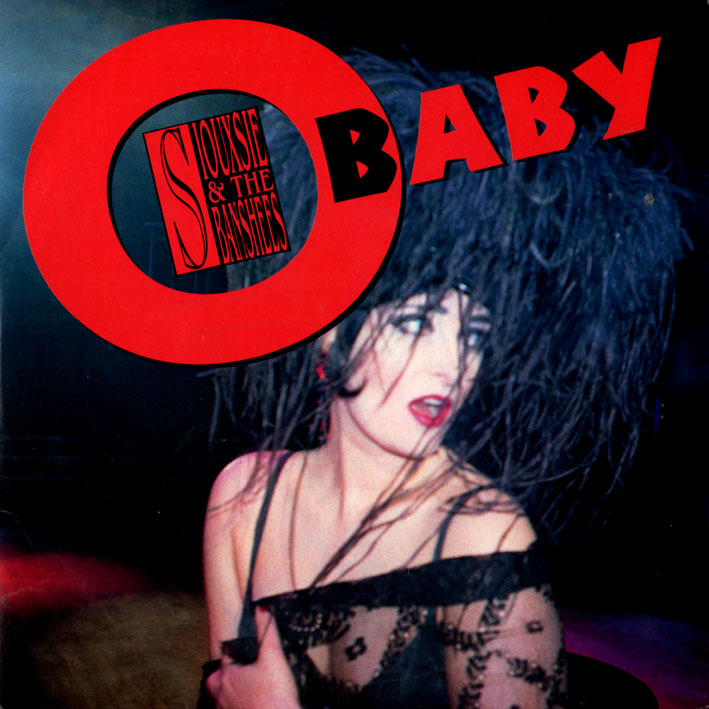 However, I must admit that I prefer Cale's production on this record even if the effect never reached the allergic reaction one might hope for. They create their own fireworks on Love Out Me, the album's bitterest tour-de-force purge, and on second and final single Stargazer, which is crying out to be as good as the Stephen Hague productions on Superstition (Cyndi Lauper fans might note her Sisters of Avalon producer Mark Saunders produces a particularly emphatic remix). Instead, it sounds like a rehearsal between the band themselves. Siouxsie's cumulative chorus explodes and evaporates in successive throaty Siouxsie-isms intentionally simulating the appearance of shooting stars - she's clever like that. The production just kills me though - it should take you around the solar system, instead they sound like they are playing in Nick Cave's dining room. At least she's still trying where her vocals suggest she's able to communicate to animals in the African plains.
However, I must admit that I prefer Cale's production on this record even if the effect never reached the allergic reaction one might hope for. They create their own fireworks on Love Out Me, the album's bitterest tour-de-force purge, and on second and final single Stargazer, which is crying out to be as good as the Stephen Hague productions on Superstition (Cyndi Lauper fans might note her Sisters of Avalon producer Mark Saunders produces a particularly emphatic remix). Instead, it sounds like a rehearsal between the band themselves. Siouxsie's cumulative chorus explodes and evaporates in successive throaty Siouxsie-isms intentionally simulating the appearance of shooting stars - she's clever like that. The production just kills me though - it should take you around the solar system, instead they sound like they are playing in Nick Cave's dining room. At least she's still trying where her vocals suggest she's able to communicate to animals in the African plains. The stoic and seductive resignation of Fall From Grace is impressively stuborn, when the weight of age seeks its final defence of experience. There is something heartbreaking about 40 somethings-or-nearly's singing candidly about admitting they might not be all that after all. It's bassist Steven Severin's lyric and not Siouxsie's so it's not as if you have to feel sorry for her autobiographically. Tender and defiant, a stunning backing vocal reveals it was there all along right at the sprawling finish.
The stoic and seductive resignation of Fall From Grace is impressively stuborn, when the weight of age seeks its final defence of experience. There is something heartbreaking about 40 somethings-or-nearly's singing candidly about admitting they might not be all that after all. It's bassist Steven Severin's lyric and not Siouxsie's so it's not as if you have to feel sorry for her autobiographically. Tender and defiant, a stunning backing vocal reveals it was there all along right at the sprawling finish.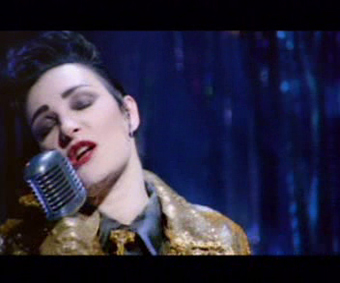 The forebodingly bruised and brusque Not Forgotten is more like a Peepshow track. The Yeah Yeah Yeah's clearly like it as they pretty much wrote their own cover version, Honeybear (the similarity is painful). Featured in the film Showgirls, yet pitifully not included on the soundtrack, you might want to check your ribs haven't been crushed once it's ended.
The forebodingly bruised and brusque Not Forgotten is more like a Peepshow track. The Yeah Yeah Yeah's clearly like it as they pretty much wrote their own cover version, Honeybear (the similarity is painful). Featured in the film Showgirls, yet pitifully not included on the soundtrack, you might want to check your ribs haven't been crushed once it's ended.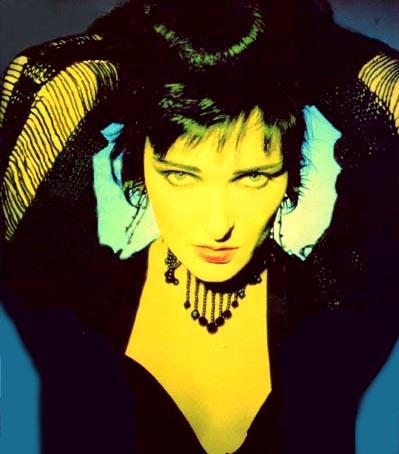 Glum low point Sick Child is a rare self-penned song that came from Budgie. It's hook is subtle and the lyrics are 6th form akward. This song just never would have made it on any other Banshees record.
Glum low point Sick Child is a rare self-penned song that came from Budgie. It's hook is subtle and the lyrics are 6th form akward. This song just never would have made it on any other Banshees record.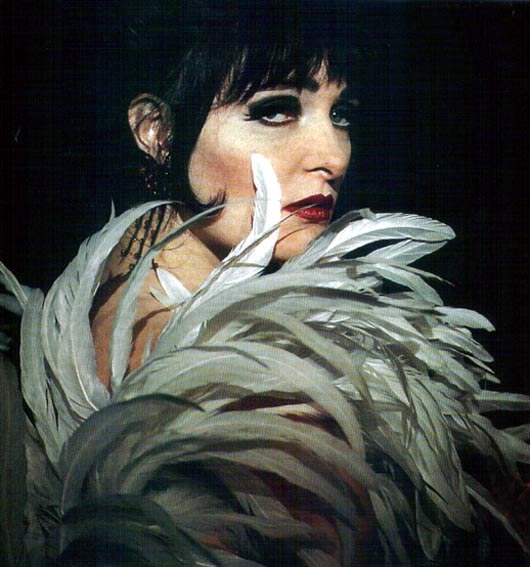 The rather hurried Falling Down is a wonderfully spitefull turn from Siouxsie, but it's a skidmark of punk and perhaps - again - might have benefited from Stephen Hague's interpretation. It just doesn't work using these settings. Another missfire. And it's a Cale track, surprisingly for me. It just sounds rather ... reluctant. The pain just isn't worth the cruelty, apotheosizing their checkered past, she's out of juice here.
The rather hurried Falling Down is a wonderfully spitefull turn from Siouxsie, but it's a skidmark of punk and perhaps - again - might have benefited from Stephen Hague's interpretation. It just doesn't work using these settings. Another missfire. And it's a Cale track, surprisingly for me. It just sounds rather ... reluctant. The pain just isn't worth the cruelty, apotheosizing their checkered past, she's out of juice here.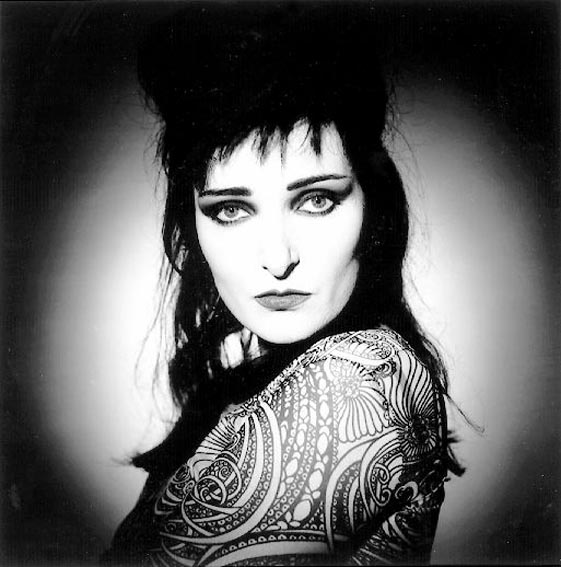 The final collaboration with him, the rippling exotica Forever is a smouldering to-the-boil torch ballad, musky and in despair. It sets Siouxsie up for what would be her ace-card on her solo album, an after-hours affair (Say meets Heaven & Alchemy before they even existed).
The final collaboration with him, the rippling exotica Forever is a smouldering to-the-boil torch ballad, musky and in despair. It sets Siouxsie up for what would be her ace-card on her solo album, an after-hours affair (Say meets Heaven & Alchemy before they even existed).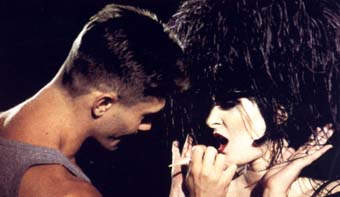 Siouxsie goes a bit Enya on The Rapture, the title track bravely attempts their own Lord's Prayer of Bohemian Rhapsody perhaps. Indulgent, yes, but Siouxise fans surely will love the safety of her voice no matter what she is singing. Ethereal. Rewards the concentration it demands or simply frustrates the concentration you don't have.
Siouxsie goes a bit Enya on The Rapture, the title track bravely attempts their own Lord's Prayer of Bohemian Rhapsody perhaps. Indulgent, yes, but Siouxise fans surely will love the safety of her voice no matter what she is singing. Ethereal. Rewards the concentration it demands or simply frustrates the concentration you don't have.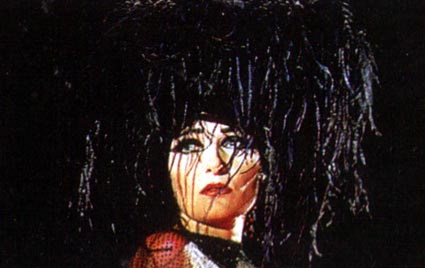 Dodgy spoken word verses aside, muddy The Double Life actually boasts a chorus that's broody enough to suggests they might even be having fun here. A homosexual radio DJ confesses his extra-marital habits. Siouxsie is authentically happy to tell the camp and cynical tale - another Severin lyric.
Dodgy spoken word verses aside, muddy The Double Life actually boasts a chorus that's broody enough to suggests they might even be having fun here. A homosexual radio DJ confesses his extra-marital habits. Siouxsie is authentically happy to tell the camp and cynical tale - another Severin lyric.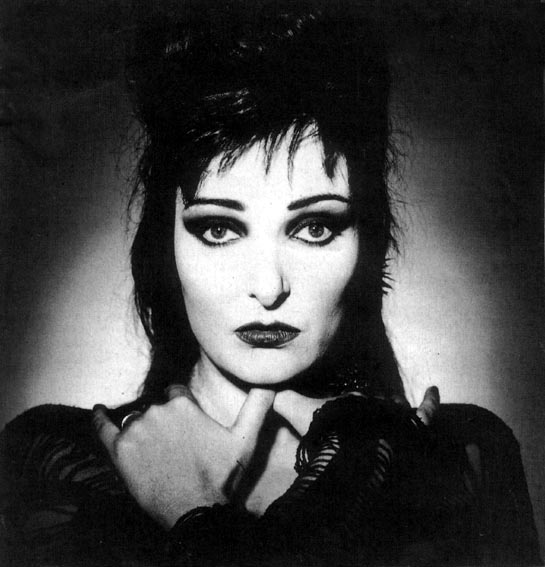 The Rapture grows immeasurably over the years - it never threatens to change your opinion or even solidify your impression of who they were, but it's definately not the run-of-the-mill trash many reviews might want you to believe. Slightly uneven, the stylistic unity of Siouxsie's catty growl is enough to marvel in itself. The prodction pigeonholes aside, they're no longer hell bent on the big time (if ever they were), the thirst is gone and at their age would be fools to pretend otherwise - the mistake is to complain when your idols get old, and The Rapture simply owns up to it, which if you can come to terms with is its strength.
The Rapture grows immeasurably over the years - it never threatens to change your opinion or even solidify your impression of who they were, but it's definately not the run-of-the-mill trash many reviews might want you to believe. Slightly uneven, the stylistic unity of Siouxsie's catty growl is enough to marvel in itself. The prodction pigeonholes aside, they're no longer hell bent on the big time (if ever they were), the thirst is gone and at their age would be fools to pretend otherwise - the mistake is to complain when your idols get old, and The Rapture simply owns up to it, which if you can come to terms with is its strength.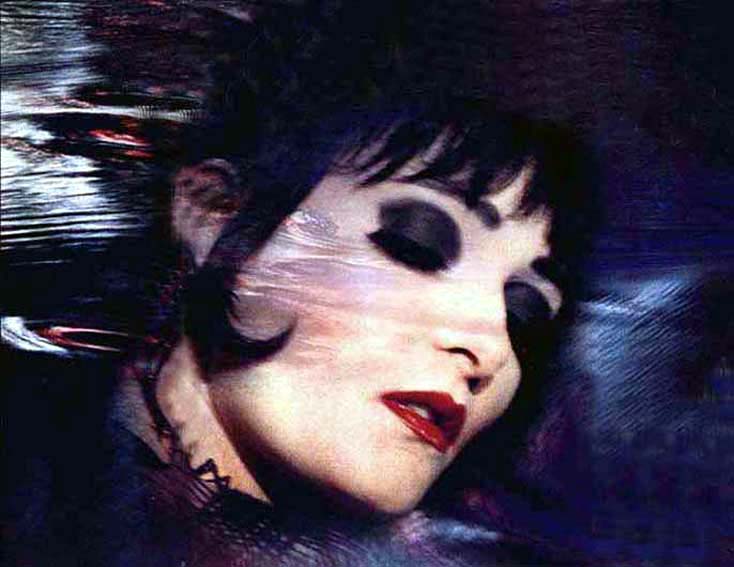

2 comments:
An amazing album.
I love this album! Siouxsie is amazing! Just one question...who is the hot guy in the picture 4 pics from the bottom with Siouxsie, it looks as if he's painting her lips?
Post a Comment